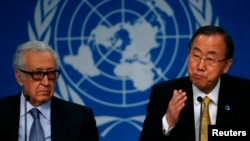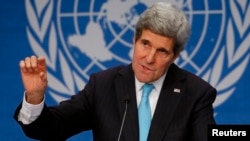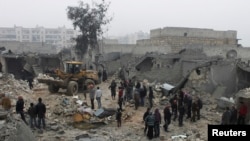U.N. mediator Lakhdar Brahimi said he will meet Syrian opposition and government delegations separately Thursday, a day ahead of their first negotiations when he will try to bring them together to discuss ending that country's bloody civil war.
Brahimi, speaking to a news conference Wednesday after all-day ministerial talks in the Swiss city of Montreux, said he has "fairly clear indications" that the parties are ready to discuss prisoner swaps, humanitarian access and local cease-fires.
"We will try to see if we meet Friday morning separately and hopefully by Friday afternoon both sides will sit in one room," he said later.
United Nations Secretary-General Ban Ki-moon told the two sides that "enough is enough," imploring them to end a conflict he said had made Syria "a breeding ground for foreign extremists and terrorists."
Ban was blunt, saying he did not expect any instant breakthroughs and the talks will be difficult. But he said the Syrian people are "desperately looking for relief from the nightmare in which they are trapped."
Assad's involvement
U.S. Secretary of State John Kerry also addressed reporters, saying there is no possibility for Syrian President Bashar al-Assad to remain in power, calling him "the single greatest magnet for terrorism in the region."
He blamed Assad's forces for killing thousands of Syrians, using starvation as a weapon of war, and other possible war crimes. Kerry said the U.S. will continue to support the Syrian people "every step of the way."
The top U.S. diplomat left the door open for Iran to participate in Syria talks, saying Tehran could make a difference in ending the conflict.
Also Wednesday, opposition leader Ahmad Jarba accused Assad of Nazi-style war crimes. But Syrian Foreign Minister Walia al-Moallem insisted that Assad is staying on as president. He bitterly accused the West of backing terrorists -- the Syrian government's word for the opposition.
Iranian representatives were notably absent from the more than 40 delegations invited to the conference, shunned by the opposition and the West for rejecting calls for a transitional government. Iran's president said Tehran's exclusion meant the talks were unlikely to succeed.
Syria's government and opposition angrily spelled out their hostility in opening remarks to the U.N.-sponsored peace conference.
Opposition's stance
The United States and the Syrian opposition said Assad had lost his legitimacy when he crushed a once-peaceful protest movement.
Opposition leader Ahmad Jarba accused the Syrian president of Nazi-style war crimes and said the Western-backed Syrian National Coalition would never accept a role for him in a transitional administration.
The Syrian government response was blunt. Information Minister Omran al-Zoubi told reporters, "there will be no transfer of power and President Bashar Assad is staying."
Syria's foreign minister, Walid al-Moallem, said terrorists and foreign meddling had ripped his country apart.
The U.S. State Department called Moallem's speech "inflammatory," and said it was not in line with the aims of the gathering - to begin the process of forming a transitional government.
Various factions
Moallem refused to give up the podium, despite requests from Ban, who asked him to refrain from inflammatory statements. Moallem angrily told the U.N. chief, "You live in New York. I live in Syria, I have the right to give the Syrian version here in this forum. After three years of suffering, this is my right.''
Russian Foreign Minister Sergei Lavrov challenged the U.S. insistence that Assad be excluded from a possible transitional administration, saying all sides must have a role and criticizing "one-sided interpretations" of the 2012 Geneva communique.
Saudi Arabia, which backs the Sunni rebels, called for Iran and its Shi'ite Lebanese ally Hezbollah to withdraw forces from Syria.
Meanwhile, fighting in Syria continued unabated. The Syrian Observatory for Human Rights reported clashes and air strikes around the country.
Nearly 9 million people - almost 40 percent of Syria's population - have been displaced by the conflict. According to U.N. relief officials, an estimated 250,000 people in Syria are out of the reach of aid deliveries. Millions more live in areas that are barely accessible.
Brahimi, speaking to a news conference Wednesday after all-day ministerial talks in the Swiss city of Montreux, said he has "fairly clear indications" that the parties are ready to discuss prisoner swaps, humanitarian access and local cease-fires.
"We will try to see if we meet Friday morning separately and hopefully by Friday afternoon both sides will sit in one room," he said later.
United Nations Secretary-General Ban Ki-moon told the two sides that "enough is enough," imploring them to end a conflict he said had made Syria "a breeding ground for foreign extremists and terrorists."
Ban was blunt, saying he did not expect any instant breakthroughs and the talks will be difficult. But he said the Syrian people are "desperately looking for relief from the nightmare in which they are trapped."
Assad's involvement
U.S. Secretary of State John Kerry also addressed reporters, saying there is no possibility for Syrian President Bashar al-Assad to remain in power, calling him "the single greatest magnet for terrorism in the region."
He blamed Assad's forces for killing thousands of Syrians, using starvation as a weapon of war, and other possible war crimes. Kerry said the U.S. will continue to support the Syrian people "every step of the way."
The top U.S. diplomat left the door open for Iran to participate in Syria talks, saying Tehran could make a difference in ending the conflict.
Also Wednesday, opposition leader Ahmad Jarba accused Assad of Nazi-style war crimes. But Syrian Foreign Minister Walia al-Moallem insisted that Assad is staying on as president. He bitterly accused the West of backing terrorists -- the Syrian government's word for the opposition.
Iranian representatives were notably absent from the more than 40 delegations invited to the conference, shunned by the opposition and the West for rejecting calls for a transitional government. Iran's president said Tehran's exclusion meant the talks were unlikely to succeed.
Syria's government and opposition angrily spelled out their hostility in opening remarks to the U.N.-sponsored peace conference.
Opposition's stance
The United States and the Syrian opposition said Assad had lost his legitimacy when he crushed a once-peaceful protest movement.
Opposition leader Ahmad Jarba accused the Syrian president of Nazi-style war crimes and said the Western-backed Syrian National Coalition would never accept a role for him in a transitional administration.
The Syrian government response was blunt. Information Minister Omran al-Zoubi told reporters, "there will be no transfer of power and President Bashar Assad is staying."
Syria's foreign minister, Walid al-Moallem, said terrorists and foreign meddling had ripped his country apart.
The U.S. State Department called Moallem's speech "inflammatory," and said it was not in line with the aims of the gathering - to begin the process of forming a transitional government.
Various factions
Moallem refused to give up the podium, despite requests from Ban, who asked him to refrain from inflammatory statements. Moallem angrily told the U.N. chief, "You live in New York. I live in Syria, I have the right to give the Syrian version here in this forum. After three years of suffering, this is my right.''
Russian Foreign Minister Sergei Lavrov challenged the U.S. insistence that Assad be excluded from a possible transitional administration, saying all sides must have a role and criticizing "one-sided interpretations" of the 2012 Geneva communique.
Saudi Arabia, which backs the Sunni rebels, called for Iran and its Shi'ite Lebanese ally Hezbollah to withdraw forces from Syria.
Meanwhile, fighting in Syria continued unabated. The Syrian Observatory for Human Rights reported clashes and air strikes around the country.
Nearly 9 million people - almost 40 percent of Syria's population - have been displaced by the conflict. According to U.N. relief officials, an estimated 250,000 people in Syria are out of the reach of aid deliveries. Millions more live in areas that are barely accessible.













